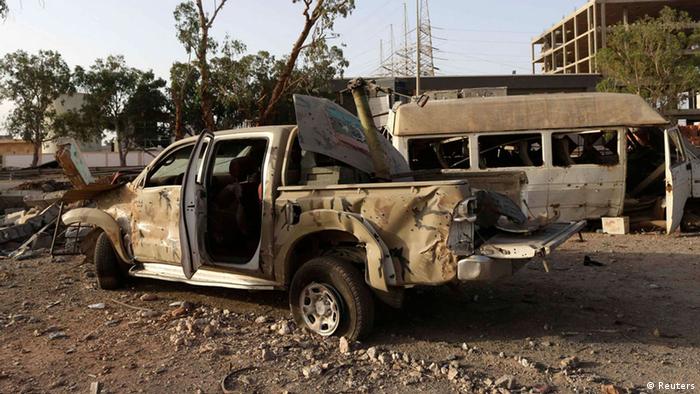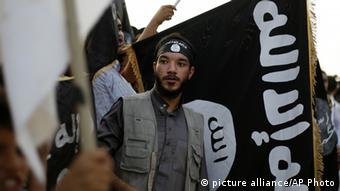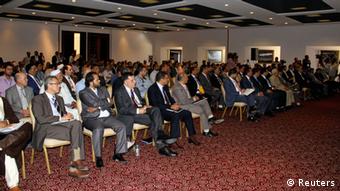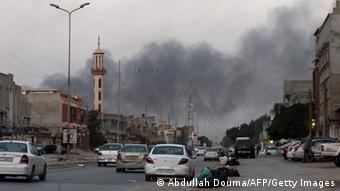LIBYA
Libya: Chronology of a collapsing state
Three years after the death of Moammar Gadhafi, Libya is marching toward civil war. The dream of a new start has given way to political anarchy - and most of the country's problems are self-inflicted.
The young revolutionaries weren't themselves. They couldn't possibly be; they had been drugged by Islamist militias of the terrorist network al Qaeda. That's what Moammar Gadhafi claimed at any rate, as he faced the first protests against his 40-year regime in January and February 2011. The revolutionaries vehemently denied his accusations.
But that did not stop Gadhafi from striking back at the spreading protests with all his might. Dozens of people lost their lives.
The months that followed only sharpened the conflict, particularly in the east of the country, in the province of Cyrenaica, where the rebels took power. They tried to march on the West but were beaten back by Gadhafi's army.
In March, Gadhafi launched his first major offensive. The resulting public cries for help were heard by the international community, and on March 17, the UN Security Council adopted Resolution 1973, demanding an immediate ceasefire and end to attacks on civilians. To enforce the demands, the resolution also provided for the establishment of a no-fly zone and the use of military means.
Any political solution, however, should have taken into account the "legitimate demands of the Libyan people." Before the vote, Russia proposed that the UN Security Council should first agree on a single resolution calling for a ceasefire in Libya. This proposal was rejected by the majority of the Council's members.
At the end of March, NATO overtook management of the so-called Unified Protector mission. NATO-led attacks continued until the end of October 2011. One of the last cities to escape the fighting was Sirte, Gadhafi's birthplace. It was there, on October 20, that he was captured by the rebels while attempting to flee. They executed him with a shot to the head.
Despite continuing clashes between Gadhafi supporters and rebels, an election was called for a constitutional assembly in June 2012. Those elected to what became the collective General National Congress were the highest parliamentary group in the land for two years. In August 2014, after a new parliamentary election, they were meant to be replaced by a House of Representatives.
Tribes and militias demand a share of power
But in the first few weeks of the General National Congress, a problem surfaced that affects Libya to this day: the tribes and militias that fought against Gadhafi during the revolution were not willing to be subsumed under state power and the rules of democratic fair play. Instead they each demanded a share of power for themselves.
There were a wide variety of coalitions in which material interests and ideological motives connected in ways that are difficult to follow. As a result, old Sufi shrines destroyed in the summer of 2012. Libyan journalist Mustafa Fetouri called it the work of radical Islamists.
"This type of violence can only be the work of fanatical groups who have ties to al Qaeda or another terrorist network," Fetouri told DW.
'Into the abyss!'
Islamist groups have allied themselves with former Gadhafi supporters. Such a group was behind the deadly attack on American Ambassador Chris Stevens in September 2012 . "Where do these people want to drive Libya?" asked the online newspaper Al watan al Libya, to which the paper itself gave the answer: "Into the abyss!"
The struggles continue today, along constantly changing fronts. Earlier this year, on May 18, Zintan Brigade units, led by General Khalifa Haftar and no longer monitored by the state, attacked the Parliament. They temporarily occupied it, but were soon forced to retreat. At the same time, other units loyal to Haftar fought against Islamist groups in Benghazi. Members of the government, Parliament and representatives of the Libyan army issued a joint statement in which they accused Haftar of attempting a coup.
Fight against Islamists and jihadists
Since June, armed Islamists, whose political representatives had only moderate success in theelections that month, have been attempting to bring Tripoli under their control. Following their assault, they declared that only their representatives will constitute the Parliament. For safety reasons, the elected Libyan Parliament has relocated to the coastal town of Tobruk, 1,000 kilometers (621 miles) east of Tripoli.
From there, Libyan MPs have asked the United Nations to help prevent the country's total collapse. "That's a confession from this democratically oriented group that man is political until the end," former Austrian military attache Wolfgang Pusztai told DW.
Libya did get some help from neighboring Egypt, as Egyptian military aircraft fired on Islamists positions in Tripoli. At the same time, they flew missions against militias of the "Islamic State," which also has offshoots in the country. In July, jihadists launched an attack against Egyptian border patrols in Libyan territory; 22 soldiers were killed.
Ebola, Ukraine and the advance of the "Islamic State" in Syria and Iraq have turned the world's attention to other regions. But the violence in Libya continues in the shadow of these other crises. An end to the fighting could be years away. dw de





No comments:
Post a Comment